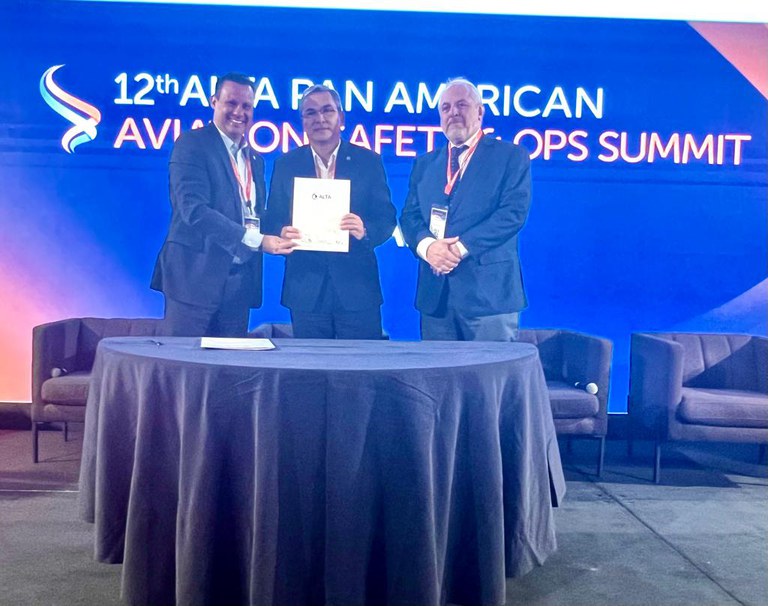Notícias
SAFETY
ANAC and ALTA move forward in unprecedented partnership for aviation safety and efficiency

During the ALTA Pan American Aviation Safety & Operations Summit, held in Santiago, Chile, the National Civil Aviation Agency (ANAC) and the Latin American and Caribbean Air Transport Association (ALTA) signed, on June 14, a Technical Cooperation Agreement that represents the advance of the unprecedented partnership for the promotion of flight safety and efficiency. The main objective of the agreement is the exchange of technical knowledge, experiences and information between the employees and collaborators of ANAC, ALTA and its members, aiming to subsidize the construction of a Supplementary Instruction that establishes rules applicable to the Required Navigation Performance Authorization Required (RNP AR) procedures in take-off operations, in addition to the qualification of ANAC’s team to evaluate the fulfillment of these criteria by air operators.
The Technical Cooperation Agreement is the result of a Memorandum of Understanding signed between ANAC and ALTA in September 2022. According to ALTA's executive director and CEO, José Ricardo Botelho, this agreement of intent established that ALTA should contribute with the technical knowledge of the association and its members aiming to equalize the regulatory environment of civil aviation in Brazil, through joint projects and actions. “With the signing of the agreement, ANAC and ALTA are strengthening their partnership and promoting the efficiency of the regulatory environment, as well as the maintenance of safety standards,” he highlights.
For ANAC director Luiz Ricardo Nascimento, the partnership between industry and regulator is an important reflection of the maturity of civil aviation, especially in Brazil, and tends to become an example for the sector worldwide. “By putting ANAC and the airlines in a collaborative and joint work venture, we are creating a shortcut to faster progress in the industry and to improved flight safety,” said Luiz Ricardo.
According to Rogério Benevides, also an ANAC director, the novelty lies in the airlines’ willingness to cooperate and the understanding that to achieve significant advances for all, the regulator and the industry need to walk in fine tune. “It’s an honor to be able to represent the Brazilian regulator in a partnership with great potential for results, since the companies have the experience of the operation and the timing of the real needs for advancement,” said Benevides.
Low Ceiling Takeoff
The first action arising is a pilot exchange project between ANAC technical staff and the industry to regulate the authorization of takeoff procedures with reduced ceiling, known as Required Navigation Performance Authorization Required Departure (RNP AR DP). This initiative is especially relevant because it aims to address the negative impacts that adverse weather conditions have on airline operations, preventing aircraft from taking off. In other words, it will particularly benefit users of the aviation system.
“It is worth noting that the normal process for the development of a regulatory standard takes time and the exchange of experiences between the industry and ANAC can facilitate this process, contributing to the improvement of the aviation sector as a whole,” reinforced ALTA’s CEO.
The Technical Cooperation Agreement represents an important milestone in the collaboration between ALTA and ANAC, demonstrating the commitment of both institutions to promote safety and efficiency in the civil aviation sector. It is expected that this partnership will bring significant benefits to both airlines and passengers, and that it will be a leading case for other countries.
ANAC Press Office with information from ALTA